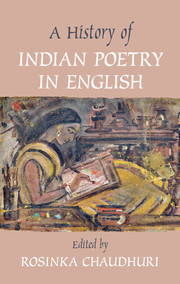Book contents
- Frontmatter
- Contents
- Contributors
- Acknowledgments
- Introduction
- SECTION I THE BROAD NINETEENTH CENTURY: INDIANS IN ENGLISH AND THE ENGLISH IN INDIA
- SECTION II PUBLISHERS, PUBLISHING HOUSES, AND THE PERIODICAL PRESS
- SECTION III POETRY: 1950–2000
- SECTION IV POETS OF THE DIASPORA
- SECTION V THE NEW MILLENNIUM POETS ON THEMSELVES
- 26 From the Language Question to the Question of Language: Three Recent Books of Indian Poetry in English
- 27 Our Speaking English Voice: A Voice That Speaks for Us?
- Bibliography
- Index
26 - From the Language Question to the Question of Language: Three Recent Books of Indian Poetry in English
from SECTION V - THE NEW MILLENNIUM POETS ON THEMSELVES
Published online by Cambridge University Press: 05 March 2016
- Frontmatter
- Contents
- Contributors
- Acknowledgments
- Introduction
- SECTION I THE BROAD NINETEENTH CENTURY: INDIANS IN ENGLISH AND THE ENGLISH IN INDIA
- SECTION II PUBLISHERS, PUBLISHING HOUSES, AND THE PERIODICAL PRESS
- SECTION III POETRY: 1950–2000
- SECTION IV POETS OF THE DIASPORA
- SECTION V THE NEW MILLENNIUM POETS ON THEMSELVES
- 26 From the Language Question to the Question of Language: Three Recent Books of Indian Poetry in English
- 27 Our Speaking English Voice: A Voice That Speaks for Us?
- Bibliography
- Index
Summary
In a 2010 interview with Almost Island, Adil Jussawalla suggested that the “younger poets” may be more explicitly demonstrative with language than the generations before them: “It's like the reader is being told, Here, I'm using a language which can do a hell of a lot.” While no observation can be all-encompassing, and no trend will apply to everyone, there is some truth to this point. Of course, one can find self-consciously “language-ey” moments across the entire history of Indian poetry in English – for instance, famously, in sections of Jussawalla's own Missing Person (1976) – but I think it can still be said that in first collections published roughly after about 1990, Indian poets in English seem to begin to understand their relationship to language differently. Language is no longer striven for as only a matter of faith and clarity, a window to the world; instead, language is a medium that itself has to be continually re-negotiated and traversed. Taken to the extreme, this idea can also mean, in some works, the covert suggestion that nothing can exist beyond or outside language, that language is not only enough for the poem but also the only remaining theater for action. In other works, by contrast, to write in English in a multilingual environment is necessarily to come to an awareness of one's own limits and to struggle with things that can never be adequately said.
These notions might be connected to new contexts for Indian poetry from the late ’80s onwards – the growing popularity, broadly speaking, of post-modernist and post-structural theory, the particular self-awareness with regards to English opened up for an entire generation by Rushdie's Midnight's Children, economic liberalization in India, and so on – but it would be presumptuous to assert these too strongly as “causes.” What we can observe is that there is a new, often explicitly marked self-consciousness and anxiety about language, as well as a greater tolerance for language as a kind of indulgence. Ironies are more complex and more uncertain; lush textures, baroque structures, periphrasis, overstatement, and repetition, to greater or lesser degrees, become features of this new poetics and prosody, for – I would argue – better and worse.
- Type
- Chapter
- Information
- A History of Indian Poetry in English , pp. 407 - 422Publisher: Cambridge University PressPrint publication year: 2016



